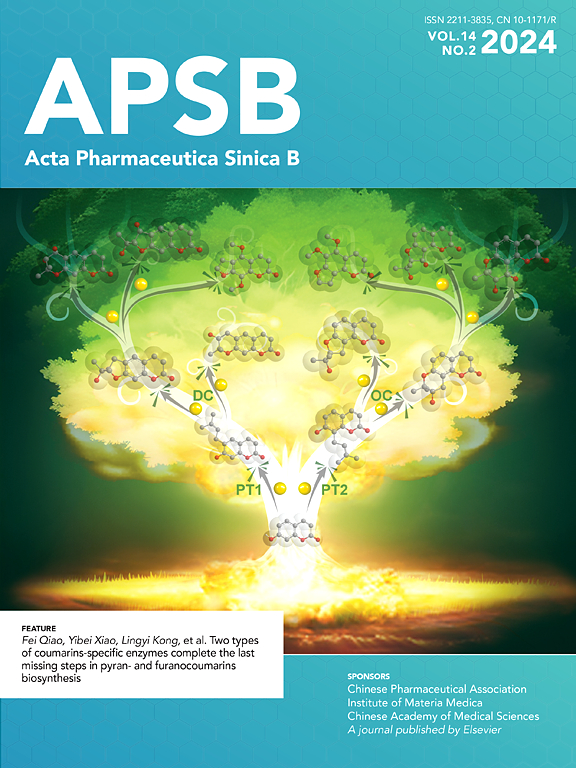影响癌症相关成纤维细胞的纳米药物递送策略以减少肿瘤转移
IF 14.7
1区 医学
Q1 PHARMACOLOGY & PHARMACY
引用次数: 0
摘要
肿瘤转移是大多数癌症高死亡率的主要原因,大量研究表明,肿瘤微环境(Tumor microenvironment, TME)中多种成分的恶性串扰共同促进肿瘤转移。癌相关成纤维细胞(cancer -associated fibroblasts, CAFs)是乳腺癌、胰腺癌、前列腺癌等多种肿瘤TME的主要基质细胞和串扰中心。近年来,cafa诱导的肿瘤前转移性TME引起了广泛的关注,被认为是肿瘤治疗的有效靶点之一。随着研究的深入,发现CAFs通过诱导肿瘤细胞上皮间质转化、重塑细胞外基质、保护循环肿瘤细胞、促进转移前生态位形成等多种机制促进肿瘤转移。为了提高抗肿瘤转移的效果,将纳米给药系统与CAF调制相结合设计治疗策略无疑是一种理想的选择,这已经被过去几十年的研究所证明。在此,我们介绍了CAFs的生理特性,详细阐述了CAFs促进肿瘤转移的可能机制,并根据其抗转移功能对基于CAFs的纳米药物递送策略进行了分类,讨论了目前面临的挑战、可能的解决方案以及未来的发展方向,以期为利用基于CAFs的纳米药物递送策略促进肿瘤转移治疗提供理论依据和参考。本文章由计算机程序翻译,如有差异,请以英文原文为准。

Nano-drug delivery strategies affecting cancer-associated fibroblasts to reduce tumor metastasis
Tumor metastasis is the leading cause of high mortality in most cancers, and numerous studies have demonstrated that the malignant crosstalk of multiple components in the tumor microenvironment (TME) together promotes tumor metastasis. Cancer-associated fibroblasts (CAFs) are the major stromal cells and crosstalk centers in the TME of various kinds of tumors, such as breast cancer, pancreatic cancer, and prostate cancer. Recently, the CAF-induced pro-tumor metastatic TME has gained wide attention, being considered as one of the effective targets for tumor therapy. With in-depth research, CAFs have been found to promote tumor metastasis through multiple mechanisms, such as inducing epithelial–mesenchymal transition in tumor cells, remodeling the extracellular matrix, protecting circulating tumor cells, and facilitating the formation of a pre-metastatic niche. To enhance the anti-tumor metastasis effect, therapeutic strategies designed by combining nano-drug delivery systems with CAF modulation are undoubtedly a desirable choice, as evidenced by the research over the past decades. Herein, we introduce the physiological properties of CAFs, detail the possible mechanisms whereby CAFs promote tumor metastasis, categorize CAFs-based nano-drug delivery strategies according to their anti-metastasis functions and discuss the current challenges, possible solutions, as well as the future directions in order to provide a theoretical basis and reference for the utilization of CAFs-based nano-drug delivery strategies to promote tumor metastasis therapy.
求助全文
通过发布文献求助,成功后即可免费获取论文全文。
去求助
来源期刊

Acta Pharmaceutica Sinica. B
Pharmacology, Toxicology and Pharmaceutics-General Pharmacology, Toxicology and Pharmaceutics
CiteScore
22.40
自引率
5.50%
发文量
1051
审稿时长
19 weeks
期刊介绍:
The Journal of the Institute of Materia Medica, Chinese Academy of Medical Sciences, and the Chinese Pharmaceutical Association oversees the peer review process for Acta Pharmaceutica Sinica. B (APSB).
Published monthly in English, APSB is dedicated to disseminating significant original research articles, rapid communications, and high-quality reviews that highlight recent advances across various pharmaceutical sciences domains. These encompass pharmacology, pharmaceutics, medicinal chemistry, natural products, pharmacognosy, pharmaceutical analysis, and pharmacokinetics.
A part of the Acta Pharmaceutica Sinica series, established in 1953 and indexed in prominent databases like Chemical Abstracts, Index Medicus, SciFinder Scholar, Biological Abstracts, International Pharmaceutical Abstracts, Cambridge Scientific Abstracts, and Current Bibliography on Science and Technology, APSB is sponsored by the Institute of Materia Medica, Chinese Academy of Medical Sciences, and the Chinese Pharmaceutical Association. Its production and hosting are facilitated by Elsevier B.V. This collaborative effort ensures APSB's commitment to delivering valuable contributions to the pharmaceutical sciences community.
 求助内容:
求助内容: 应助结果提醒方式:
应助结果提醒方式:


